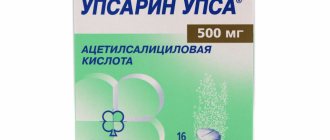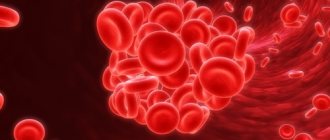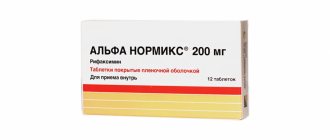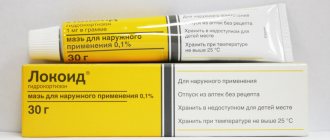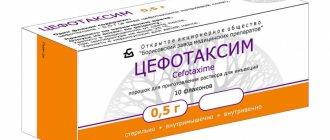Among the effective antipyretic and painkillers, the drug “Upsarin Upsa” stands out. This is a fast-acting medicine based on acetylsalicylic acid. Eliminates pain in the head, joints, teeth, muscles, helps normalize body temperature. Approved for use by adults and children over 15 years of age. The medicine is inexpensive and accessible; you can buy it at any pharmacy; you don’t need to present a prescription.
Effervescent “Aspirin Upsa”: composition, pharmacology
The drug is produced in the form of tablets, highly soluble in water. They are called effervescent because when mixed with liquid they actively release bubbles of carbon dioxide. The active component of the product is organic acetylsalicylic acid. The following are used as excipients: aspartame, sodium in the form of anhydrous carbonate and bicarbonate, citric acid, sulfur in the form of dioxide and others.
The drug acts as an analgesic and antipyretic, inhibits inflammatory processes. It dissolves in water, resulting in the formation of a buffer solution that does not precipitate in the highly acidic environment of gastric juice.
Tablets are stored in a temperature range from 15 to 25 degrees Celsius, excluding access to sunlight. Must be kept away from children. The general shelf life is 3 years from the date of production.
Medicine aspirin cardio
In addition to the fact that the drug belongs to the category of NSAIDs and has an antipyretic effect and analgesic effect, aspirin cardio is used in the primary prevention of diseases of the cardiovascular system and in the secondary prevention of myocardial infarction. Reduces the risk of developing the disease with unstable angina. The drug is prescribed for cardiovascular pathologies due to its antithrombotic effect.
The main difference between the drug and regular aspirin is that aspirin cardio is coated with a special enteric coating. Due to this, it is used for long courses in cardiology. This coating allows the active substance to be released in the intestines, thereby minimizing one of the main side effects of aspirin - damage to the gastric mucosa.
Composition of the drug
The active ingredient of the drug is acetylsalicylic acid.
Excipients include corn starch and cellulose powder.
The enteric coating contains polysorbate, sodium lauryl sulfate, talc and other compounds.
Thus, when prescribing the drug, individual intolerance to the components of the composition should be taken into account.
Release form and dosage
The drug aspirin cardio is available only in the form of enteric-coated tablets in dosages of 100 mg and 300 mg.
The number of tablets in a package can be: 20 pcs., 28 pcs., 56 pcs.
Indications and contraindications
Tablets are indicated for use in the presence of the following diseases and disorders:
- pain in muscle tissue;
- joint pain;
- toothaches;
- headaches;
- symptoms of neuralgia;
- pain during menstruation;
- sharp pain in the thoracic spine;
- migraine;
- high body temperature (the medicine is used to treat adults and children over 15 years of age).
In some cases, taking Upsarin Upsa is contraindicated:
- children under 14 years of age inclusive;
- hypersensitivity to any drug substances;
- bronchial asthma;
- pregnancy (during the 1st and 3rd trimesters);
- breastfeeding (entire period);
- ulcers of the digestive system (exacerbation period);
- internal bleeding in the stomach and/or intestines;
- malabsorption of galactose, glucose;
- lack of vitamin K;
- combination with drugs such as methotrexate and oral anticoagulants.
Take pills with caution in the following cases:
- gout;
- ulcerative formations in the digestive organs;
- urate type nephrolithiasis;
- allergies to medications;
- pregnancy at the stage of the second trimester;
- combination with other drugs containing acetylsalicylic acid or methotrexate;
- hypermenorrhea;
- simultaneous combination with anticoagulants.
In these cases, a preliminary consultation with a doctor is indicated. If side effects occur, a change in therapy may be necessary.
Aspirin C effervescent tablets 400mg/240mg No. 2x5
Name
Aspirin C tablet. 400 mg/240 mg in strip pack No. 2x5
Description
Round, flat, beveled white tablets with an imprint in the form of a branded BAYER cross on one side.
Main active ingredient
Acetylsalicylic acid+ascorbic acid
Release form
Effervescent tablets
Dosage
400 mg+240 mg
Pharmacological properties
Acetylsalicylic acid has an analgesic, antipyretic, and anti-inflammatory effect associated with the suppression of cyclooxygenases 1 and 2, which regulate the synthesis of prostaglandins; inhibits platelet aggregation. Ascorbic acid plays an important role in the regulation of redox processes, carbohydrate metabolism, blood clotting, tissue regeneration, and helps increase the body's resistance.
Indications for use
For symptomatic relief of moderate or mild pain of various origins (headache, toothache, menstrual pain, sore throat due to infections, pain in joints and muscles). Increased body temperature in infectious and inflammatory diseases. It is recommended to pay attention to the information regarding use in children and adolescents (see section "Precautions").
Directions for use and doses
Use during pregnancy and lactation
The drug should not be used in the first and second trimester of pregnancy; Short-term use of the drug in low doses (not higher than 150 mg) as prescribed by a doctor is possible only if the expected benefit to the mother exceeds the potential risk to the fetus. The use of the drug is contraindicated in the third trimester of pregnancy. If it is necessary to use the drug during lactation, breastfeeding should be discontinued. There is evidence that drugs that inhibit prostaglandin synthesis can impair a woman's fertility by affecting the ovulation process. This is grounds for stopping treatment.
Precautionary measures
Regarding the use of acetylsalicylic acid
- with hypersensitivity to other analgesics, anti-inflammatory or antirheumatic drugs or other allergenic substances;
- if you have allergies (eg skin reactions, itching, hives), asthma, hay fever, nasal polyposis or chronic respiratory infections;
with concomitant therapy with anticoagulants;
- with ulcerative lesions of the stomach or intestines (history), or a tendency to gastrointestinal bleeding;
- in case of liver dysfunction;
- in case of impaired renal function and cardiovascular system (for example, vascular kidney disease, congestive heart failure, dehydration, major surgery, sepsis or extensive hemorrhagic manifestations), since acetylsalicylic acid will contribute to the risk of impaired renal function and the development of acute renal failure;
- before surgery (including minor operations such as tooth extraction), as bleeding may increase;
- in patients with severe glucose-6-phosphate dehydrogenase deficiency, acetylsalicylic acid may cause hemolysis or hemolytic anemia. Contributing factors: high dose, high fever or acute infection.
Regarding the use of ascorbic acid
- with a predisposition to the formation of urinary stones from calcium oxalate;
- with thalassemia, hemochromatosis.
Other precautions One effervescent tablet contains 20.3 mmol (466.4 mg) sodium. This should be taken into account by patients on a sodium controlled (low sodium/salt) diet. Long-term use of analgesics can lead to headaches, which, when treated with additional analgesics, can lead to prolonged headaches. Regular use of analgesics can lead to chronic kidney damage with the risk of developing kidney failure (analgesic nephropathy). This risk is especially high when several different analgesics are taken at the same time. In small doses, acetylsalicylic acid reduces the excretion of uric acid from the body, which can cause an attack of gout in patients with a predisposition to reduced renal excretion. Children and adolescents Children and adolescents with illnesses accompanied by high fever should take acetylsalicylic acid only as directed by a doctor and if other therapeutic measures have failed. Prolonged vomiting in the presence of such a condition may be a sign of Reis' syndrome, a very rare but life-threatening disease that requires immediate treatment.
Interaction with other drugs
Increased effect up to increased risk of side effects:
- Anticoagulants/thrombolytics: Acetylsalicylic acid may increase the risk of bleeding if taken before thrombolytic treatment is started. Therefore, attention should be paid to signs of external or internal bleeding in patients who are planning to undergo thrombolytic treatment.
- platelet aggregation inhibitors, for example, ticlopidine, clopidogrel: increased risk of bleeding;
- other non-steroidal analgesics/anti-inflammatory drugs (at doses of 3 g of acetylsalicylic acid per day or more): increased risk of developing ulcerative lesions and bleeding in the gastrointestinal tract;
- systemic glucocorticosteroids (with the exception of hydrocortisone used in replacement therapy for Addison's disease): increased risk of gastrointestinal side effects;
- alcohol: increased risk of developing ulcers and bleeding in the gastrointestinal tract;
- Digoxin: increased concentration in blood plasma;
- antidiabetic drugs: blood glucose levels may decrease;
- methotrexate: decreased excretion from the body and displacement by salicylates from protein binding;
- valproic acid: displacement by salicylates from binding with proteins;
- selective serotonin reuptake inhibitors (SSRIs): increased risk of gastrointestinal bleeding due to a synergistic effect.
Weakening of action:
- diuretics (in combination with doses of acetylsalicylic acid 3 g per day or higher);
- angiotensin-converting enzyme inhibitors (in combination with doses of acetylsalicylic acid 3 g per day or higher);
- uricosuric drugs (eg, probenecid, benzbromarone)
- deferoxamine: concomitant use with ascorbic acid may increase tissue toxicity of iron, especially in the myocardium, and cause cardiac decompensation.
Contraindications
- hypersensitivity to salicylates or components of the drug;
- asthma caused by taking salicylates or other NSAIDs;
- erosive and ulcerative lesions of the gastrointestinal tract (in the acute phase);
- hemorrhagic diathesis;
- hemophilia, thrombocytopenia;
- severe dysfunction of the liver, kidneys and heart;
- combined use of methotrexate at a dose of 15 mg per week or more;
- III trimester of pregnancy.
Compound
Active ingredients: acetylsalicylic acid 400 mg, ascorbic acid (vitamin C) 240 mg; excipients: sodium dihydrogen citrate, sodium bicarbonate, anhydrous citric acid, anhydrous sodium carbonate.
Overdose
Moderate intoxication: tinnitus, hearing impairment, sweating, nausea, vomiting, headache and dizziness in all cases of overdose. This intoxication can be eliminated by reducing the dose. Severe intoxication: high fever, hyperventilation, ketosis, respiratory alkalosis, metabolic acidosis, coma, cardiogenic shock, respiratory failure, acute hypoglycemia. Treatment: if there are signs of poisoning, induce vomiting or do a gastric lavage, prescribe activated charcoal and a laxative, and consult a doctor. Intoxication is more likely in older patients and, especially, in young children (therapeutic overdose or accidental intoxication can be fatal for them).
Side effect
From the circulatory and lymphatic system: rarely and very rarely - serious bleeding, such as intracerebral hemorrhage (especially in patients with uncontrolled hypertension and/or concomitant use of antihemostatic drugs), which in some cases can be life-threatening. Hemolysis and hemolytic anemia in patients with severe forms of glucose-6-phosphate dehydrogenase deficiency. Bleeding problems such as nosebleeds, bleeding gums or skin hemorrhages, possibly prolonged bleeding from the genitourinary system (see section "Precautions"). This effect can last up to 4-8 days after administration. Gastrointestinal tract: often - abdominal pain, nausea, vomiting, heartburn; rarely - ulcerative lesions of the gastrointestinal tract, which in very rare cases can lead to perforation; gastrointestinal bleeding, which in very rare cases can lead to iron deficiency anemia; inflammation of the gastrointestinal tract. CNS: headache, dizziness, tinnitus, hearing loss, confusion. Urinary system: at high doses - hyperoxaluria and formation of urinary stones, damage to the glomerular apparatus of the kidneys. From the skin and subcutaneous tissues: rarely - skin hypersensitivity reactions; rarely - severe skin hypersensitivity reactions (up to exudative erythema multiforme). Immune system: rarely - hypersensitivity reactions from the respiratory tract, gastrointestinal tract, cardiovascular system, especially in asthmatics: possible drop in pressure, shortness of breath, rhinitis, nasal congestion, anaphylactic shock, Quincke's edema. From the liver and biliary tract: very rarely - increased liver function is indicative. From the kidneys and urinary system: impaired renal function and acute renal failure. If such symptoms appear, it is recommended to stop taking the drug and consult a doctor. Reporting Adverse Reactions If any adverse reactions occur, consult your physician. This recommendation applies to any possible adverse reactions, including those not listed in the package insert. You can also report adverse reactions to the National Adverse Drug Reaction Information Database, including information about drug failures. By reporting side effects, you can help provide more information about the safety of the drug.
Storage conditions
At a temperature not exceeding 25 °C, out of the reach of children.
Side effects
Side effects are rare; they can occur in different organ systems:
- nausea, vomiting;
- bleeding in the stomach and/or intestines;
- painful sensations in the abdomen;
- diarrhea;
- loss of appetite;
- ulcers in the stomach;
- headaches;
- tinnitus;
- dizziness;
- skin rashes;
- bronchospasm;
- attack of bronchial asthma;
- bleeding in the gums;
- slowing down blood clotting processes;
- nasal polyposis.
General description:
Helps quickly against colds, headaches and fevers - with extra vitamin C.
Whether your pain is due to a cold, headache or fever, you will get help quickly ASPIRIN plus C forte Thanks to the fast-dissolving effervescent tablets, the active ingredient is activated in water and can quickly and effectively combat pain and fever.
Aspirin Plus C Forte contains twice the active ingredient compared to regular Aspirin Plus C. You can fight pain even more effectively! Thanks to its effervescent composition, the active ingredients of Aspirin Plus C Forte can be absorbed very quickly by the body, ensuring a rapid onset of action.
The vitamin C contained in Aspirin Plus C Forte may help strengthen the immune system and support the body's defenses. The body's defenses require ascorbic acid to effectively fight pathogens such as viruses. Therefore, vitamin C stimulates the formation of special protective cells and increases their activity.
In addition, Aspirin Plus C forte contains so-called buffer substances, which are guaranteed to improve the solubility of the active ingredient.
Result: recovery is much faster!
For use for pain in the neck, head and limbs
Instructions for use "Upsarin Upsa"
You need to take 1 or 2 tablets at a time, dissolving them completely in a glass/half glass of water. Dosage depends on age:
- Children over 15 years of age and adults take 1 tablet up to 6 times a day. If the temperature is high or the pain is severe, take 3 tablets at a time up to 3 times a day. In this case, a minimum interval between procedures of 4 hours is required.
- Elderly patients take 1 tablet up to 4 times daily. If the pain is severe or there is a high temperature, take 2 tablets at a time. In this case, a minimum interval of 4 hours must also be maintained. Moreover, for elderly patients the maximum daily dose of the drug is 4 tablets.
Acetylsalicylic acid + Ascorbic acid (Acidum acetylsalicylicum + Acidum ascorbinicum)
Acetylsalicylic acid
Absorption is complete and fast. During absorption, it undergoes presystemic elimination in the intestinal wall and in the liver (deacetylated). The half-life of the drug is 15-20 minutes; it is quickly hydrolyzed to salicylates (in the gastrointestinal tract, liver and blood). It circulates in the body (75-90% in connection with albumin) and is distributed in tissues in the form of salicylic acid anion. Cmax is reached in approximately 2 hours. During biotransformation in the liver, metabolites are formed that are found in many tissues and urine. Excretion of salicylates occurs primarily through active secretion in the renal tubules in unchanged form and in the form of metabolites. The excretion of unchanged substances and metabolites depends on the pH value of urine (with alkalinization of urine, the ionization of salicylates increases, their reabsorption worsens and excretion increases significantly).
Ascorbic acid
When administered orally, it is rapidly absorbed, sufficient concentration in the blood is observed after 30 minutes, maximum after 2 hours. Part of the drug is absorbed in the stomach, most of it in the small intestine. With an increase in dose to 200 mg, up to 140 mg (70%) is absorbed; with a further increase in dose, absorption decreases (50-20%). Communication with plasma proteins - 25%. The normal concentration of ascorbic acid in plasma is approximately 10-20 mcg/ml, and body stores are about 1.5 g when taking daily recommended doses and 2.5 g when taking 200 mg per day. TCmax after oral administration is 4 hours.
Easily penetrates into leukocytes, platelets, and then into all tissues; the highest concentration is achieved in the glandular organs, leukocytes, liver and lens of the eye; deposited in the posterior lobe of the pituitary gland, adrenal cortex, ocular epithelium, interstitial cells of the seminal glands, ovaries, liver, spleen, pancreas, lungs, kidneys, intestinal wall, heart, muscles, thyroid gland; penetrates the placenta.
Metabolized primarily in the liver into deoxyascorbic acid and further into oxaloacetic and diketogulonic acids.
It is excreted by the kidneys, through the intestines, with sweat, and breast milk in the form of unchanged ascorbate and metabolites.
When high doses are prescribed, the rate of elimination increases sharply. Smoking and drinking ethanol accelerate the destruction of ascorbic acid (conversion into inactive metabolites), sharply reducing reserves in the body.
Excreted during hemodialysis.
Absorbed in the duodenum, partially in the ileum (absorption decreases with increasing dose). F - 20-50% (when taking a dose exceeding 200 mg). Reserves in the body are about 1.5 g. Depot: leukocytes, platelets, endocrine glands, liver, ocular epithelium, lungs, kidneys, intestinal wall, heart, muscles. Communication with plasma proteins - 25%. Biotransformation in the liver. Elimination by the kidneys (in the form of metabolites).
special instructions
With long-term use of Upsarin Upsa, the development of Reye's syndrome is possible. It is accompanied by liver failure, severe vomiting, liver distention and acute encephalopathy. It is worth considering that acetylsalicylic acid delays the excretion of uric acid. Therefore, in some cases, an attack of gout cannot be ruled out.
After long-term treatment with the drug, it is recommended to donate blood and feces for general tests. If surgery is planned, stop taking Upsarin Upsa a week before.
When else should you not take aspirin?
- With high blood pressure.
Because taking it may increase the risk of hemorrhagic stroke in this case. If you have hypertension, you should take aspirin only when your blood pressure is adequately controlled.
- If you suspect a stroke.
If we are dealing with a suspected stroke (a person suddenly developed severe weakness in an arm or leg, speech, motor disturbances, the corner of the mouth is drooping, he cannot smile, etc.), in no case should aspirin be given in this situation. There are no objective signs that allow one to clearly differentiate between hemorrhagic (associated with cerebral hemorrhage) and ischemic (associated with blockage of a cerebral artery by an atherosclerotic plaque) type of stroke. And if the stroke is hemorrhagic, and we give such a person aspirin, then it’s scary to imagine how it could end...
All you need to do if you suspect a person is having a stroke is to lay him in a horizontal position, try to calm him down and call an ambulance as soon as possible.
Cases of overdose
The main symptoms of overdose include:
- severe pain in the head;
- hearing and vision problems;
- dizziness;
- nausea and vomiting;
- respiratory failure;
- depressed state of consciousness, rarely - coma.
Symptomatic treatment is indicated; in extreme cases, you should immediately seek emergency medical help.
Indications:
Mild to moderate pain, such as: headache, toothache, menstrual pain, pain symptoms associated with colds (for example, sore throat, head and limbs), fever.
- Treats severe colds (sore throat, head and body) and fever
- Has anti-inflammatory properties
- High dose of vitamin C
Thanks to the effervescent composition, the active ingredients are released in a short time and are quickly absorbed by the body - this is a necessary condition for a rapid onset of action.
Side effects
Sometimes taking Aspirin can cause negative effects, these include:
- Pain in the stomach
- Decreased platelets in the blood
- Bronchospasm
- Various skin rashes
Taking Aspirin for a long time sometimes leads to the development of bleeding in the gastrointestinal tract. Signs characterizing this pathology:
- Anemia
- Tarry stool
- Weakness, excruciating abdominal pain
If the above symptoms appear, you should stop taking Aspirin and seek medical help.
Contraindications for Aspirin
Prohibitions on taking Aspirin are divided into two types:
- Relative
- Absolute
Taking Aspirin is strictly prohibited if you are allergic to acetylsalicylic acid or other non-steroidal anti-inflammatory drugs. In addition to all this, the drug should not be used if there is an increased tendency to bleeding.
Relative contraindications:
- Bronchial asthma
- Combined use of anticoagulants
- Breast-feeding
- Pregnancy
- Chronic stomach diseases
- Kidney dysfunction
- Diabetes
- Age up to 12 years
If there are relative prohibitions, taking the medicine is possible only after approval by the doctor.
